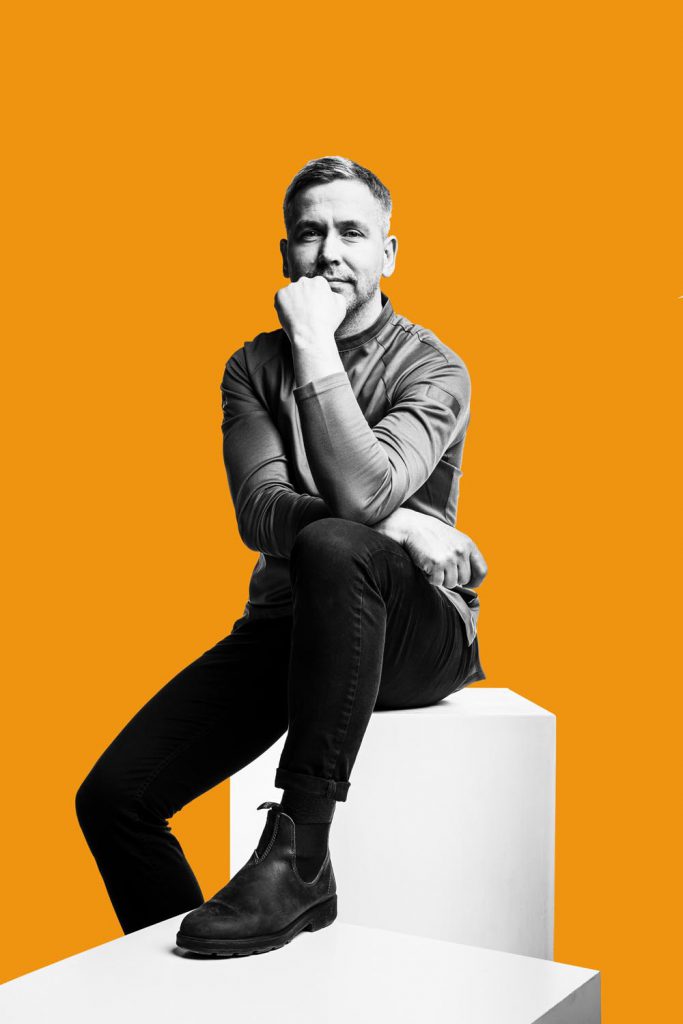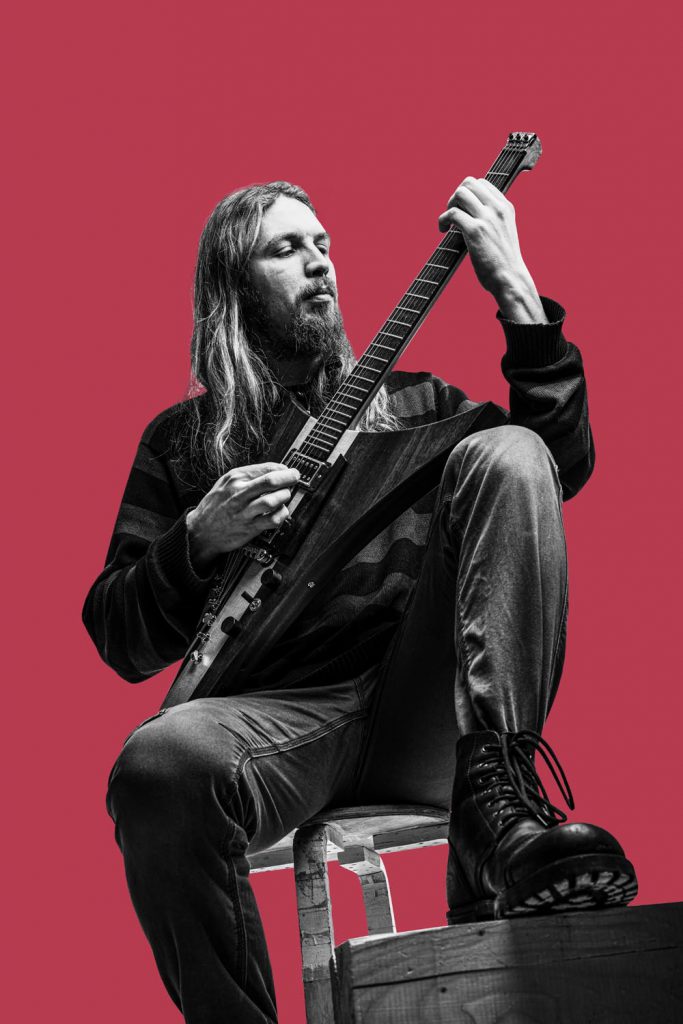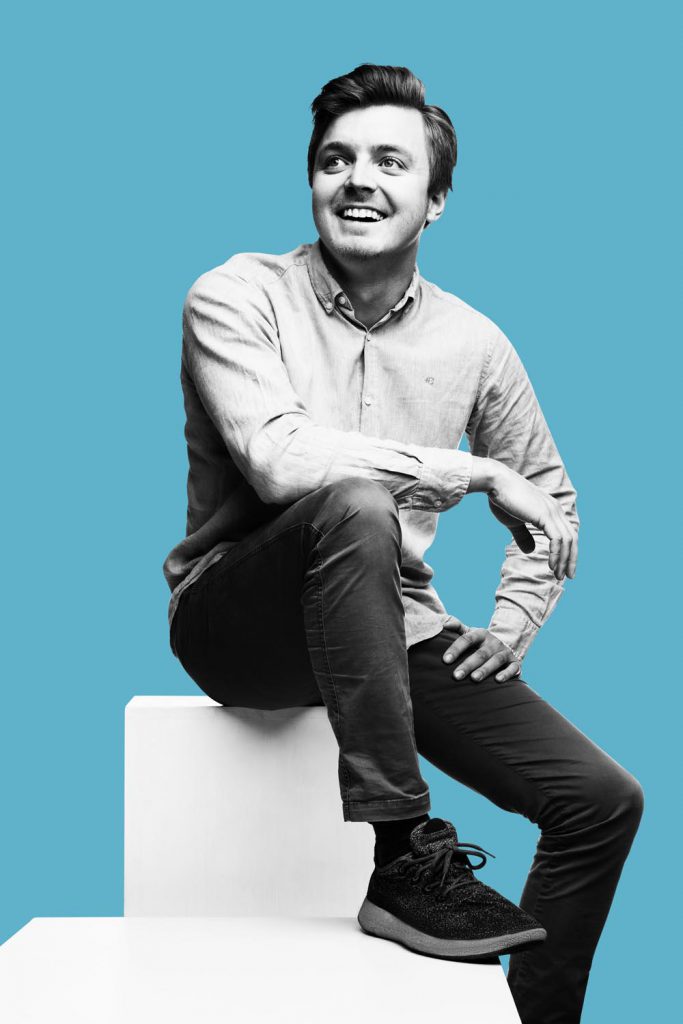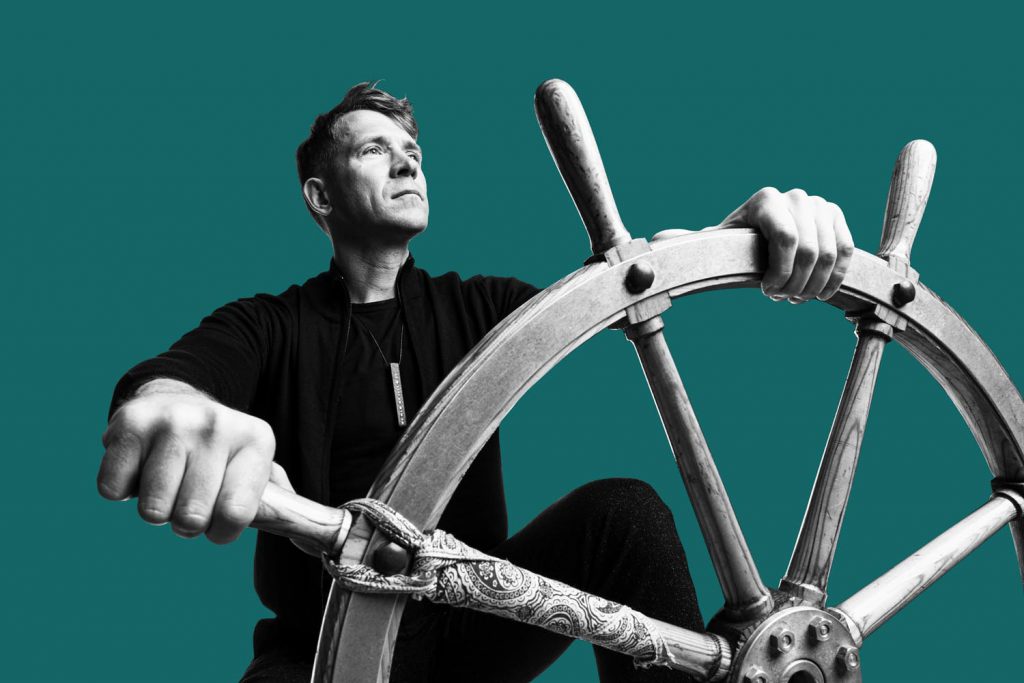The island feeling catches those who have been lucky enough to visit the islands. For some, the island “bug” has enchanted them so much that they have decided to stay. Others, who have been born on the islands, sometimes decide to go and explore the world. But they never truly leave the islands behind. There is something island-like that will always radiate from everything they do and from their mindset. Therefore, the island feeling is, in fact, the island people themselves, and it’s the islanders that are the ambassadors for that certain island touch. At least this has been the case for Peeter, Gert, Kaarel and Silver.
Peeter Pihel (44) was born on Saaremaa and moved to somewhere much bigger – the mainland – in his late teens. He is the founder and head chef of the Fotografiska restaurant, which operates on zero waste principle and is one of the most popular restaurants in Tallinn.
What has inspired you to work in this field?
I believe I was lucky to have a happy childhood in Kaarma. Wandering around in the woods, I picked up a lot of knowledge about plants and herbs. To this day, I know where something grows in my home forest. That inner map is still accurate and works, especially when it comes to mushrooming. I have not lost my local island dialect either, and those who pick up on it, will know where I am from. On the other hand, my childhood was also quite modest – we had to manage with what we had. There has been a natural way of thinking my whole life. In my opinion, the world has also come to a point where we should consume less.

What does sustainability mean to you?
In my work, I have always respected good food and the story it tells. I have made a sustainable way of cooking my mission, and I believe that my island heritage has played a big role in this. To phrase it more sophisticatedly, sustainability is essentially a concept. Sometimes it is great to work within the limits we have set for ourselves. To transfer this analogy to the island context, it would mean that you cook from what is available on the island. It is simple, logical, and much easier than it would be to add all the delicacies of the world to your menu. This is also the reason why some cuisines taste better in certain places. The place and the moment in which you taste it are part of the charm, and it is wonderful that smoked flounder tastes the best on Saaremaa!
Sustainability in everyday life means making conscious choices. Through this, we try to get the world’s “foundation” back and balance fast-paced life, mass production, and fast consumption. I feel that currently, the world is very crooked in that sense.
A tip on what to visit, experience or notice on the islands.
When discovering new places, bring a bag with you to pick up rubbish as you go. Unfortunately, we still see it lying around sometimes. If you are making a longer pit stop in the form of camping, do it so that when you leave it looks as if you’d never been there. Let’s respect and value what our nature has to offer. I believe we all want to keep our islands the way they are! Of one thing I am certain – Saaremaa is the best place to experience slow living, which is one of the skills for a sustainable life. You simply come here, and life is already a tad quieter.
Gert Simso (32) is originally from Pallasmaa village on Muhu. Although life has taken him to Viljandi and elsewhere, he is now moving back to Muhu with his family, where he plans to continue making wooden musical instruments.
What has inspired you to work in this field?
Music has always been close to my heart, and because of that, instruments have always seemed magical to me. If there is any string instrument in the room, then to me, its presence alone makes the room come alive, and when you listen closely, every sound made in the room resonates from the instrument.
I have always had the mindset to make things for myself whenever possible. So it was natural for me to make instruments myself. Slowly but surely, it has become an obsession and an unyielding passion.

What does sustainability mean to you?
Muhu has always been somewhat different from the other islands. For example, you can tell by looking at the island’s architecture that Muhu has not had a lot of forests. Therefore, it’s common to have beautiful stone buildings. Muhu heritage and customs are a source of inspiration to me. I also use as many local resources as I can, both materials and human resources. I believe our local wood is in no way inferior to the tropical wood that is normally used in musical instruments. You just need to find the right one. I have already made a bass guitar of juniper. Soon I will be done with a guitar which shape was inspired by a twisted juniper slice – a technique that one can spot in almost every souvenir shop on the island. I am also working on guitar straps with the Muhu pattern, painting the pattern on instruments etc., which involves working with other Muhu artists. Recently, I made a sea-themed electric guitar. In the details, I want to start using pieces of dolomite and seashells etc. that can be found on the beach. Sustainability is a way of thinking. It’s a way to use what you have in a beautiful and determined way, which represents the island well. This is how Muhu has raised me to be.
A tip on what to visit, experience or notice on the islands.
The nature on the islands is different from the rest of Estonia. It is the biggest resource. A great way to slow down your everyday fast-paced lifestyle is to make a fire at the beach and watch the sunset. While walking on the beach, look for beautiful pebbles. Notice and respect the locals and their customs – many expect island life to be peaceful and quiet. So slow down, and most importantly, leave no trace that you’ve ever been there, so the next visitor can also enjoy our clean nature.
Kaarel Kotkas (28) was born in Kärdla, Hiiumaa. He started school in Tallinn when he was 16 and it’s where he founded the tech company Veriff.
What has inspired you to work in this field?
My childhood and growing up on a farm have taught me that the only way to counter a lack of progress is to take action. This is my belief today as well. It’s also what inspired me to create Veriff. It’s way too easy to be someone you’re not on the internet. On the other hand, technology enables the verification of people’s true identities more precisely than you could determine with a face-to-face meeting. As an islander, it seemed to me that if I don’t solve this problem, no one will. These days, identity verification is an essential part of providing services and moving around on the internet. I am motivated by the idea that if I am successful in my work, Veriff’s services are available to users regardless of their location, and I get to spend more time on Hiiumaa.

What does sustainability mean to you?
Life on Hiiumaa has taught me that you should always leave a space in better condition than you found it. Different clean-up days and a respectful attitude towards nature have spared the island and created an aura around it that cannot be experienced anywhere else.
A tip on what to visit, experience or notice on the islands.
Hiiumaa’s nature, and peace and quiet have a certain appeal. The island has its own rhythm, which you might perhaps best experience during a few events in summer, for example around Midsummer’s Day, at Hiiumaa’s Cafeteria Days and at different concerts in Sõru harbour.

Silver Roostik (41) was born and raised on Ruhnu. Although life took him to Tallinn for nearly twenty years, the waves have since carried him back to Ruhnu’s shores.
Silver is a man of many talents. For the last decade, he has organised the popular Intsikurmu festival in Põlva, together with his friend Mihkel. He manages a cocktail bar on the motorboat Svea, which he operates together with his three brothers. He is also Svea’s captain and takes people on short trips around Ruhnu. He is restoring an old border guard cordon with a group of friends, and they plan on building a hostel and a creative hub there, which will host many exciting events in the future. He is also taking part in developing the Viscosa Cultural Hub on Hiiumaa – a hundred-year-old former silk factory and plan on filling it with cultural programme. For the last seven years, he has worked at the Watermill Center in NYC during the summer, where he produces an annual gala for their art centre. Over the last few years, he has made handcrafted jewellery of black oak and silver under the name Silver by Roostik. The jewellery is mounted with Morse code symbols made of silver. Every customer can order a message of their choosing on their jewellery. The message can also be given some structure, so that it can be read just like braille. Next to all this, Silver raises his daughter Ithaka and is considered Ruhnu’s lousiest fisherman.
What has inspired you to take action?
Very good friends. And life on Ruhnu. These have taught me to be resilient and at the same time, smart and stubborn like a pine tree in a storm. I believe that creative economy is the key to the sustainability of small islands.
What does sustainability mean to you?
Here on Ruhnu, we don’t have the privilege of choosing the partners we work with, so we have grown to tolerate disagreements, as long as they remain withing the bounds of common sense, including the curvature of the Earth. Also, as a voluntary firefighter and a lifeguard, I find that the same principles apply to island life – we face challenges as a united front and all the niggles that may have occurred at the coffee table are forgotten. The common truth here is simple: everything you do comes back to you. If you throw rubbish overboard on one side of the island, you will catch it in your net on the other side. It applies to everything and everywhere on the island. Kicking yourself in the butt is one of the dumbest things to do, although maybe not for those from Kihnu (a little joke – ed).
A tip on what to visit, experience or notice on the islands?
Follow the island rhythm, leave personal agendas behind, take time and listen. Collect awesome memories! There is no other place in Estonia that is more exciting, beautiful, cleaner and safer than Ruhnu.